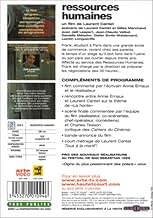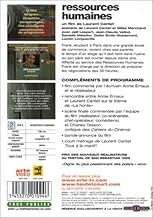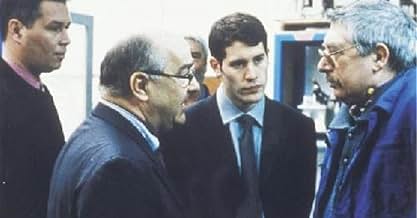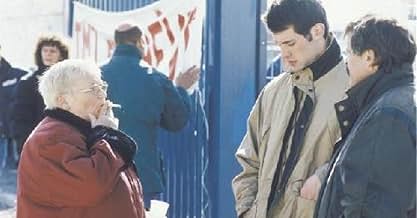CALIFICACIÓN DE IMDb
7.2/10
2.9 k
TU CALIFICACIÓN
Frank, hijo de un gerente, regresa a casa y su visión ayuda a reducir la plantilla, tensando sus lazos con su padre obrero, en el impacto de la semana laboral de 35 horas en las relaciones l... Leer todoFrank, hijo de un gerente, regresa a casa y su visión ayuda a reducir la plantilla, tensando sus lazos con su padre obrero, en el impacto de la semana laboral de 35 horas en las relaciones laborales.Frank, hijo de un gerente, regresa a casa y su visión ayuda a reducir la plantilla, tensando sus lazos con su padre obrero, en el impacto de la semana laboral de 35 horas en las relaciones laborales.
- Dirección
- Guionistas
- Elenco
- Premios
- 19 premios ganados y 5 nominaciones en total
Didier Woldemard
- Alain
- (as Didier Emile-Woldemard)
- Dirección
- Guionistas
- Todo el elenco y el equipo
- Producción, taquilla y más en IMDbPro
Opiniones destacadas
I am French and I am very proud when I see that such a movie can be produced in my country - It's not a movie with Gerard Depardieu, it's a movie with real situations and real people, about working in a factory, blue collar and white collar confrontation, family feud. Acting is great with only one professional actor, the rest being amateurs. I highly recommend it. It's not an easy piece. But it will you make think.
Although the context for this film is the political tension surrounding the introduction of the 35 working week, the soul of the film lies in the relationship between father and son and its power to evoke folk memories of other, epic, generational struggles.This power comes not so much from what is said but from what is NOT said - looks, gestures, silences.This makes it sound as though the film is ponderous but it isn't: the context makes sure that there's plenty of action and there is a lightness of touch in the family scenes.The two struggles ( familial and political)are perfectly intertwined with each adding meaning to the other.The Human Resources of the title therefore refers not just the rather inhuman term for personnel management - but also to the resources which father and son find within themselves to cope with their respective situations.
There is a naturalness about the location, the setting and the pace that makes this film a refreshing change from Hollywood High Tech. It is well worth seeing.
There is a naturalness about the location, the setting and the pace that makes this film a refreshing change from Hollywood High Tech. It is well worth seeing.
Despite the apparently 'dry' subject matter of conflict in the workplace, this is a passionate film. At times,the scenes are so realistic and so involved that you forget this is a film and are actually watching scenes from real people's lives (which is perhaps because many of the actors are no-professionals as in Bresson & Loach). The film does not provide any easy answers, only more questions. I found the scenes between the father & son very moving especially the one at the end where the father continues working at his lathe whilst the son first berates him for his failure to stand up for his rights and then hurls his father's work angrily onto the floor. A very compassionate film.
HUMAN RESOURCES / (1999) ***1/2 (out of four)
By Blake French:
The powerful, heartbreaking new French drama "Human Resources," written by Laurent Cantet and Gilles Marchand, is so authentic the only true professional actor in the cast is Jalil Lespert, who plays Franck, the son of a workaholic. The rest of the performers were chosen from unemployment organizations in regard to the business the characters would have to play. "The title "human resources" is first of all a reaction against the cynicism of that expression," explains director Laurent Cantet in an interview. "A human being is administered the same way you would administer stocks or capital." After watching this film we understand what he means by those words.
The working characters employed by a personnel division factory where Franck's dad is currently employed. He has been working there for thirty years and is happier when his son is emotionally further apart from him. Franck has defied his family heritage, went to college, and has recently returned to the French home where his parents live. He gets a job as a manager at the company in which his father works. This is where he becomes torn between business opportunities and staying loyal to his principles of fairness and morality. The people at the factory treat the workers like machines, and it is then when he understands "human resources" refers to people as variables in the production flow graphs.
Director Laurent Cantet is not from a working class family, as cleared up in a press kit, so these skillful and wise foreign filmmakers decided to get ideas confirmed by those who did live that life. The parts of the factory workers are played by actual workers; the boss is a real boss; the union leader is a real union leader. The film is also shot in an authentic working factory, as if a documentary was in the creation. Cantet was absolutely correct: who better to imitate the positions and postures of a worker's body bent over a factory machine, or especially the language itself, much of which was selected the workers themselves. The factory's supervisors are cutting back, and Franck gets the privilege of listening to the suggestions that a recent questionnaire asks. The questionnaire is to help make the employers, who are drained of most consciousness on the job, feel they are important to the success of the corporation. Then, while snooping around on the boss's computer, Franck finds the questionnaire is nothing but a pretense for upcoming layoffs, that of which his father is on the list. While Franck is furious at the deceptions, his father refuses to even go on strike after learning of his fate-he is simply to used to consistence and routine, he fears change.
The movie is more about the inner struggle between Franck and his father than the actual protesting by the employees or how the factory supervisors fight back. American movies are not often about factory workers, and when they are, the subject is more parody, like in "Officer Space" (1999), than class struggle. One of the best arguments this movie makes is that class struggle is still alive today, and has a high impact of various societies. There are other themes in "Human Resources": greed and power, communication between Franck and his family, the father-son association he has with his boss, finding one's place in society, and shame and regret.
"Human Resources" is of the most penetrating films of the year; it offers descriptive writing and empathizing characters. Shot in a documentary style, the direction is focused and sincere, and the performances are mesmerizing. The only thing keeping it from perfection is the somewhat slow-moving script that occasionally strays idle when some of the most important events take place. Beyond that, however, "Human Resources" is a must-see if you are a fan of original, reality theme-based dramas.
By Blake French:
The powerful, heartbreaking new French drama "Human Resources," written by Laurent Cantet and Gilles Marchand, is so authentic the only true professional actor in the cast is Jalil Lespert, who plays Franck, the son of a workaholic. The rest of the performers were chosen from unemployment organizations in regard to the business the characters would have to play. "The title "human resources" is first of all a reaction against the cynicism of that expression," explains director Laurent Cantet in an interview. "A human being is administered the same way you would administer stocks or capital." After watching this film we understand what he means by those words.
The working characters employed by a personnel division factory where Franck's dad is currently employed. He has been working there for thirty years and is happier when his son is emotionally further apart from him. Franck has defied his family heritage, went to college, and has recently returned to the French home where his parents live. He gets a job as a manager at the company in which his father works. This is where he becomes torn between business opportunities and staying loyal to his principles of fairness and morality. The people at the factory treat the workers like machines, and it is then when he understands "human resources" refers to people as variables in the production flow graphs.
Director Laurent Cantet is not from a working class family, as cleared up in a press kit, so these skillful and wise foreign filmmakers decided to get ideas confirmed by those who did live that life. The parts of the factory workers are played by actual workers; the boss is a real boss; the union leader is a real union leader. The film is also shot in an authentic working factory, as if a documentary was in the creation. Cantet was absolutely correct: who better to imitate the positions and postures of a worker's body bent over a factory machine, or especially the language itself, much of which was selected the workers themselves. The factory's supervisors are cutting back, and Franck gets the privilege of listening to the suggestions that a recent questionnaire asks. The questionnaire is to help make the employers, who are drained of most consciousness on the job, feel they are important to the success of the corporation. Then, while snooping around on the boss's computer, Franck finds the questionnaire is nothing but a pretense for upcoming layoffs, that of which his father is on the list. While Franck is furious at the deceptions, his father refuses to even go on strike after learning of his fate-he is simply to used to consistence and routine, he fears change.
The movie is more about the inner struggle between Franck and his father than the actual protesting by the employees or how the factory supervisors fight back. American movies are not often about factory workers, and when they are, the subject is more parody, like in "Officer Space" (1999), than class struggle. One of the best arguments this movie makes is that class struggle is still alive today, and has a high impact of various societies. There are other themes in "Human Resources": greed and power, communication between Franck and his family, the father-son association he has with his boss, finding one's place in society, and shame and regret.
"Human Resources" is of the most penetrating films of the year; it offers descriptive writing and empathizing characters. Shot in a documentary style, the direction is focused and sincere, and the performances are mesmerizing. The only thing keeping it from perfection is the somewhat slow-moving script that occasionally strays idle when some of the most important events take place. Beyond that, however, "Human Resources" is a must-see if you are a fan of original, reality theme-based dramas.
This was a positive surprise... I didn't have a clue what to expect when I rented Ressources Humaines, but it turned out to be a great film with fine performances from the cast (especially Jalil Lespert and Jean-Claude Vallod).
First, the premise is very interesting. What happen with the family dynamics when the sons and daughters are more educated than their parents? Of course, that is only one aspect of this film's premise. Second, the scene where Franck is yelling at, and blaming, his father is absolutely heartrending. Only a stone wouldn't react to that masterful scene. Third, "entertaining" is hardly the word to describe Ressources Humaines, but I have to say that this film seemed much shorter than tired comedies like Charlie's Angels and Scary Movie.
(8/10) Highly recommended.
First, the premise is very interesting. What happen with the family dynamics when the sons and daughters are more educated than their parents? Of course, that is only one aspect of this film's premise. Second, the scene where Franck is yelling at, and blaming, his father is absolutely heartrending. Only a stone wouldn't react to that masterful scene. Third, "entertaining" is hardly the word to describe Ressources Humaines, but I have to say that this film seemed much shorter than tired comedies like Charlie's Angels and Scary Movie.
(8/10) Highly recommended.
¿Sabías que…?
- TriviaSame script structure as Oliver Stone's "Wall Street".
- Bandas sonorasQuatuor N°13 en la mineur
Composed by Franz Schubert
Performed by Melos Quartett (as Melos Quartet)
Published by Harmonia Mundi
Selecciones populares
Inicia sesión para calificar y agrega a la lista de videos para obtener recomendaciones personalizadas
Detalles
- Fecha de lanzamiento
- Países de origen
- Sitio oficial
- Idioma
- También se conoce como
- Human Resources
- Locaciones de filmación
- Productoras
- Ver más créditos de la compañía en IMDbPro
Taquilla
- Total en EE. UU. y Canadá
- USD 116,866
- Fin de semana de estreno en EE. UU. y Canadá
- USD 29,526
- 17 sep 2000
Contribuir a esta página
Sugiere una edición o agrega el contenido que falta






















